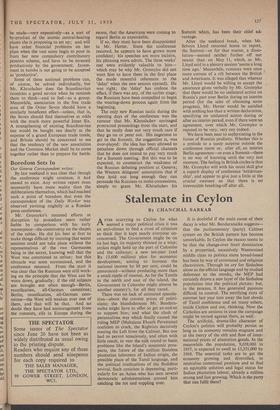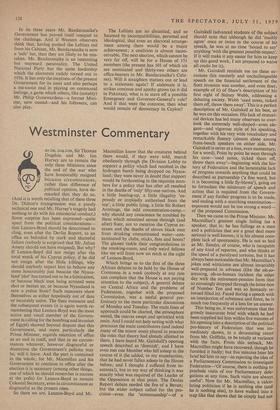Stalemate in Ceylon
By CHANCHAL SARKAR
AFTER scurrying to Ceylon for what seemed a major political crisis it was an anti-climax to find a crust of cynicism so thick that it kept nearly everyone un- concerned. The Government might be on its last legs, its majority thinned to a wisp; strikes might hold up the port of Colombo and the railways; a new ten-year (and Rs 13,600 million) plan for economic development, aiming to increase the national income by 88 per cent, could be announced—without producing more than a small ripple of interest. As for the Tamils in the north and east of the island, the Government in Colombo might almost be another country's, for all they cared.
There was no lack of animated specula- tion—about the current prices of politi- cians; the blandishments Mr. Bandara- naike might have to offer to get so-and-so to support him; and what the clash of personalities was which finally caused the ruling MEP (Mahajana Eksath Peramuna) coalition to crack, the Rightists decisively ousting the Left from the Cabinet. But one had to persist tenaciously, and often with little result, to veer the talk round to basic problems like the island's economic pros- pects, the future of the million Stateless plantation labourers of Indian origin, the possible place of the Tamil language, and the political implications of the Buddhist revival. Such cynicism is depressing, parti- cularly for an Asian who has seen several democratic administrations around him catching the rot and toppling over. It is doubtful if the main cause of their decay is what Mr. Bandaranaike suggests— that the parliamentary (party) Cabinet system on the British pattern has become unworkable. In Ceylon the reason seems to be that the change-over from domination by a propertied, excessively Westernised middle class to politics more broad-based has been by way of communal and religious chauvinism. Through its cry for Sinhalese alone as the official language and by studied deference to the monks, the MEP had certainly drawn a new layer of the Sinhalese population into the political picture; but, in the process, it has generated passions difficult to control. The terrifying riots of summer last year tore away the last shreds of Tamil confidence and set many others, inside Ceylon and out, thinking. Now the Catholics are anxious in case the campaign might be turned against them, as well.
The artificial, drama-like character of Ceylon's politics will probably persist as long as its economy remains stagnant and at the mercy of the ebb and flow of inter- national prices of plantation goods. In the meanwhile the population, 9,658,000 in 1957, is expected to swell to 13,351,000 by 1968. The essential tasks are to get the economy growing and diversified, to neutralise communal passions and to find an equitable solution and legal status for Indian plantation labour, already a million strong and fast growing. Which is the party that can fulfil them? In its three years Mr. Bandaranaike's Government has proved itself unequal to the challenge. And if Western observers think that, having pushed the Leftists out from his Cabinet, Mr. Bandaranaike is now a 'safe' bet, then they are likely to be mis- taken. Mr. Bandaranaike is an interesting but wayward personality. The United National Party has the same leadership which the electorate rudely turned out in 1956. It has only the ineptness of the present Government for its asset and also perhaps a me-tooist zeal in playing on communal feelings, a game which others, like (notably) Mr. Philip Gunewardena—a former Mini- ster, now ousted—and his followers, can also play. The Leftists are so disunited, and so haunted by incompatibilities, personal and ideological, that even an electoral arrange- ment among them would be a major achievement; a coalition is almost incon- ceivable. The next election, which cannot be very far off, will be for a House of 151 members (the present has 101 of which six are nominated and thirty-two others are office-bearers in Mr. Bandaranaike's Cabi- net). Will it straighten matters out or lead to a stalemate again? If stalemate it is, strikes continue and apathy grows (as it did in Pakistan), what is to stave off a possible Emergency and Governor-General's rule? And if that were the outcome, then what would remain of democracy in Ceylon?































 Previous page
Previous page